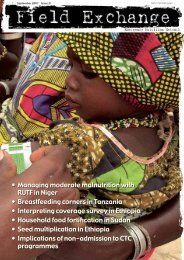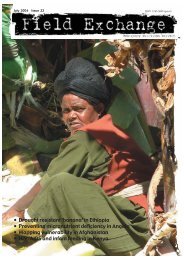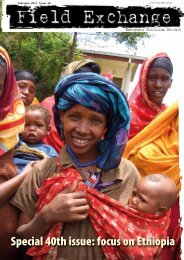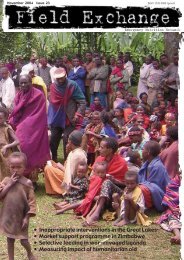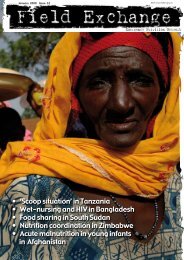Download a PDF of this issue - Field Exchange - Emergency ...
Download a PDF of this issue - Field Exchange - Emergency ...
Download a PDF of this issue - Field Exchange - Emergency ...
Create successful ePaper yourself
Turn your PDF publications into a flip-book with our unique Google optimized e-Paper software.
Focus on coverage assessment<br />
Data collection team measuring<br />
MUAC in the village <strong>of</strong><br />
Hamakouladji, Sony Aliber<br />
municipality (Gao, Mali)<br />
Remote<br />
monitoring<br />
<strong>of</strong> CMAM<br />
programmes<br />
coverage:<br />
SQUEAC lessons<br />
in Mali and<br />
Mauritania<br />
By Jose Luis Alvarez Moran, Brian<br />
Mac Domhnaill and Saul Guerrero<br />
Jose Luis Alvarez Moran is a<br />
Medical Doctor with a PhD in<br />
International and Public Health. He<br />
works as an assistant in Rey Juan<br />
Carlos University and is currently<br />
conducting nutrition surveys for<br />
Action Against Hunger.<br />
Brian MacDomhnaill is an independent<br />
expert in monitoring and<br />
evaluation <strong>of</strong> health programmes.<br />
He has worked in Ghana, Brazil,<br />
Angola, Mauritania and Djibouti.<br />
Saul Guerrero is the Evaluations,<br />
Learning and Accountability (ELA)<br />
Advisor at Action Against Hunger<br />
(ACF-UK). Prior to joining ACF, he<br />
worked for Valid International Ltd.<br />
in the research, development and<br />
roll-out <strong>of</strong> CTC/CMAM. He has worked in Afghanistan,<br />
Algeria, Chad, DRC, Ethiopia, Indonesia, Kenya, Liberia,<br />
Malawi, Mali, Mozambique, Nepal, Niger, Nigeria,<br />
Sierra Leone, North & South Sudan and Zambia.<br />
The authors would like to thank Chantal Autotte<br />
Bouchard, David Kerespars, Dr. Theophane Traore,<br />
INSTAT, and the ACF teams in Mali, Mauritania and<br />
Spain (Elisa Dominguez in particular) for their support.<br />
To Ernest Guevara (Valid International) and Mark Myatt<br />
(Brixton Health) for their valuable comments and to<br />
the European Commission Office for Humanitarian Aid<br />
& Civil Protection (ECHO) for their financial support.<br />
K Greeenway, Zambia, 2009<br />
Action Against Hunger (ACF)<br />
currently supports community<br />
based management <strong>of</strong> acute<br />
malnutrition programmes<br />
(CMAM) programmes in over 20 countries<br />
around the world, with a long-standing presence<br />
in the Sahel region <strong>of</strong> West Africa,<br />
including Mauritania, Niger, Mali and Chad.<br />
Most <strong>of</strong> these interventions are integrated<br />
CMAM programmes, operated by Ministries<br />
<strong>of</strong> Health and local partners with technical<br />
and logistical support from ACF teams on the<br />
ground. Monitoring the impact <strong>of</strong> these interventions,<br />
and their coverage in particular, is<br />
<strong>of</strong> paramount importance to the organisation.<br />
Increasing coverage was instrumental in the<br />
shift from inpatient care in the form <strong>of</strong> therapeutic<br />
feeding centres (TFCs) to outpatient<br />
models (CMAM) and remains one <strong>of</strong> the<br />
most widely accepted indicators <strong>of</strong><br />
programme performance and impact. Whilst<br />
other indicators (e.g. cure rates, length <strong>of</strong><br />
stay, average weight gain) provide an insight<br />
into the efficacy <strong>of</strong> treatment, only when<br />
combined with coverage do they provides an<br />
accurate and reliable indication <strong>of</strong> the needs<br />
met by a programme. Since December 2010,<br />
ACF has been increasingly relying on the<br />
Semi-Quantitative Evaluation <strong>of</strong> Access &<br />
Coverage (SQUEAC) to measure programme<br />
coverage and identify the factors affecting the<br />
performance <strong>of</strong> CMAM programmes 1 .<br />
According to a recent UNICEF estimation,<br />
there are 55 countries currently implementing<br />
CMAM in one form or another 2 . The scale<br />
<strong>of</strong> CMAM programming, limited nongovernmental<br />
organisation (NGO) resources,<br />
and deteriorating security conditions in<br />
many regions (including in the north-west<br />
and Horn <strong>of</strong> Africa) is increasingly forcing<br />
support organisations such as ACF to operate<br />
remotely with limited access to programme<br />
areas. The extent <strong>of</strong> the constraints varies,<br />
from limited access to areas within a district<br />
(e.g. ACF supported programme in<br />
Guidimaka, Mauritania), to limited access to<br />
parts <strong>of</strong> a country (e.g. ACF supported<br />
programme in Gao, Mali) to limited access to<br />
an entire country (e.g. ACF supported<br />
programmes in Somalia). All <strong>of</strong> these environments<br />
present challenges, in particular for<br />
the implementation <strong>of</strong> monitoring and evaluation<br />
activities with a strong field component<br />
such as SQUEAC.<br />
Monitoring coverage remotely<br />
Experiences in using SQUEAC remotely have<br />
been limited, with the most notable experience<br />
provided by Valid International and<br />
Oxfam-Novib in Somalia 3 (see Box 1).<br />
Recently, ACF carried out SQUEAC investigations<br />
in Mauritania (February 2011) and<br />
Mali (July-August 2011). In both cases, lack <strong>of</strong><br />
security prevented the SQUEAC lead investigators<br />
from travelling to the programme<br />
areas. In the case <strong>of</strong> Gao (Mali), the lead<br />
investigator was unable to visit the district in<br />
which the programme operated but was able<br />
to visit a neighbouring district. In the case <strong>of</strong><br />
Guidimaka (Mauritania), the investigator<br />
was able to visit the district but could not<br />
travel to most areas outside <strong>of</strong> the district<br />
capital.<br />
The analysis presented here will draw<br />
largely from these two experiences. A brief<br />
synopsis <strong>of</strong> the SQUEAC methodology and<br />
its key features in more conventional settings<br />
is included in Box 2. The article focuses its<br />
attention on two general stages <strong>of</strong> using<br />
SQUEAC to monitor programme coverage<br />
remotely: planning and implementation. It<br />
will conclude with some lessons learned and<br />
provide practical suggestions for other practitioners<br />
wishing to undertake similar<br />
exercises in the future.<br />
ACF’s remote experiences in Mali and<br />
Mauritania<br />
CMAM programmes supported by ACF in<br />
Gao (Mali) and Guidimaka (Mauritania) are<br />
largely inaccessible to expatriate staff due to<br />
security threats posed by AQMI (Al-Qaida au<br />
Maghreb Islamique) in the region. Security<br />
threats do not prevent local teams from<br />
implementing programme activities, but<br />
monitoring supervision is more difficult since<br />
the local teams <strong>of</strong>ten need to travel to more<br />
accessible areas to meet with technical<br />
support and management staff. The decision<br />
to evaluate the coverage <strong>of</strong> both these<br />
programmes forced the organisation to<br />
explore different means <strong>of</strong> employing<br />
SQUEAC.<br />
Both investigations faced similar accessibility<br />
problems and relied on the work <strong>of</strong><br />
external SQUEAC lead investigators brought<br />
into the programme especially to carry out<br />
the investigations. The lead investigators had<br />
constant remote support from ACF’s<br />
Evaluations, Learning & Accountability<br />
1<br />
For more on the SQUEAC method and its use see Myatt,<br />
M. SQUEAC: Low resource method to evaluate access<br />
and coverage <strong>of</strong> programmes. (<strong>Field</strong> <strong>Exchange</strong>,<br />
<strong>Emergency</strong> Nutrition Network, Issue 33, June 2008,<br />
p.3) & Sch<strong>of</strong>ield, L. et.al. (2010) SQUEAC in routine<br />
monitoring <strong>of</strong> CMAM programme coverage in Ethiopia<br />
(<strong>Field</strong> <strong>Exchange</strong>, Issue 38, April 2010, <strong>Emergency</strong><br />
Nutrition Network, p.35).<br />
2<br />
UNICEF & Valid International (2011) Global Mapping<br />
Review <strong>of</strong> Community-based Management <strong>of</strong> Acute<br />
Malnutrition with a focus on Severe Acute Malnutrition<br />
(Nutrition Section, Nutrition in <strong>Emergency</strong> Unit, UNICEF<br />
HQ-NY and Valid International, March 2011)<br />
3<br />
Valid International. Personal Communication.<br />
Box 1: Monitoring coverage remotely in Somalia: The Valid International experience<br />
Valid International has supported the set-up, monitoring<br />
and evaluation <strong>of</strong> a community therapeutic<br />
care (CTC) programme in Mogadishu, Somalia for<br />
the past 2 years. The monitoring and evaluation<br />
support was built around the assessment <strong>of</strong> coverage<br />
using SQUEAC as a framework. Hence,<br />
components <strong>of</strong> the SQUEAC toolbox were put in<br />
place right from programme set-up. This allowed<br />
for a more organic SQUEAC process that followed<br />
the programme cycle <strong>of</strong> implementation.<br />
This was deemed suitable in the context <strong>of</strong><br />
programming in Mogadishu where access to the<br />
programme sites by external persons is an <strong>issue</strong>.<br />
Institutionalising a routine system <strong>of</strong> coverage evaluation<br />
was the most suitable way and SQUEAC<br />
proved to be an effective framework. This allowed<br />
for a mechanism by which the use <strong>of</strong> different<br />
components <strong>of</strong> the SQUEAC toolbox at various periods<br />
or steps, rather than in ‘just one go’ typical <strong>of</strong><br />
other investigations. This also allowed for remote<br />
external support to be provided appropriately and<br />
as needed.<br />
This is the approach that Valid International is<br />
taking in contexts such as Mogadishu but is an<br />
approach that is ideal even in developmental and<br />
more stable conditions.<br />
34



